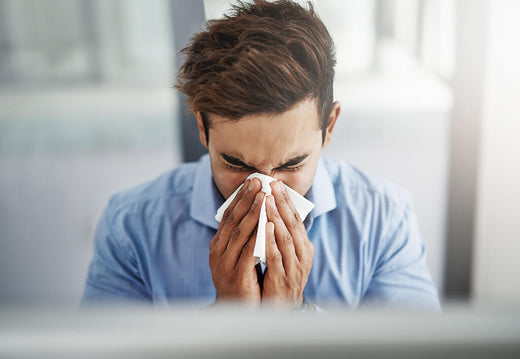The most common time we think about our noses is during cold and flu season, but a runny nose could be a year-round problem. Understanding what causes a runny nose is vital for comprehensive management.
A runny nose is likely the result of something called “allergic rhinitis,” which is an inflammation of your nasal lining. Apart from allergic rhinitis, other triggers can include viral infections, irritants like strong odors or smoke, sinus congestion, and even hormonal changes. By identifying these root causes, individuals can take proactive steps to alleviate symptoms and maintain nasal health throughout the year.
How to Relieve a Runny Nose
Before you reach for tissues, consider that blowing your nose too hard could actually further irritate your nasal lining. To give your nasal passages a break, it may help to hold a tissue under your nose to catch the dripping—or try only blowing one nostril at a time. Another way to experience temporary relief is to use a neti pot or inhale steam.
If you're searching for how to get rid of a watery runny nose fast and effectively, here are some steps to consider:
Get plenty of rest
Rest is crucial for navigating any infection. Prioritize ample sleep to aid your body in battling symptoms. A doctor-approved over-the-counter antihistamine medication can help manage symptoms, paving the way for restorative sleep.
Stay hydrated and eat healthy
Nourish your body with proper hydration and a balanced diet to bolster your immune system. Drinking fluids and consuming nutritious foods can work wonders for supporting your body's natural defenses.
Clear the air
Environmental factors play a significant role in nasal issues. An air purifier can be a valuable tool in eliminating allergens and irritants that might exacerbate a runny nose or nasal congestion. Clean air can provide relief from a runny nose not only during periods of illness but also in between colds.
Use a cough, cold, or flu medication
Understanding the difference between a runny nose vs a stuffy nose is essential to navigating appropriate treatments for nasal congestion. A runny nose involves excess mucus flow and dripping, often triggered by allergies or viral infections. In contrast, a stuffy nose is characterized by nasal congestion, which causes difficulty breathing through the nose due to swollen nasal tissues. Recognizing these differences guides tailored treatments to address inflammation, mucus production, and congestion for optimal relief and improved nasal comfort.
To address a runny nose head-on, consider products that contain antihistamines, which are effective in targeting runny nose symptoms. The Maximum Mucinex® Fast-Max® line of products includes options designed specifically for runny nose relief, helping to alleviate discomfort quickly and effectively.
While a runny nose can be annoying and disruptive, knowing how to get rid of a runny nose fast and employing the right products for runny nose relief can help ease your discomfort and ensure you're not constantly reaching for tissues for extended periods. By incorporating these strategies into your daily routine, you can effectively address a runny nose and promote swift recovery.
References
- https://www.mucinex.com/blogs/cold-flu-symptoms/got-a-runny-nose-causes-symptoms-and-treatments
- https://goaskalice.columbia.edu/answered-questions/nose-wont-stop-running
- https://www.health.harvard.edu/diseases-and-conditions/allergic-rhinitis-your-nose-knows
- https://www.nyee.edu/patient-care/medical-information/p/post-nasal-drip
- https://www.mayoclinic.org/diseases-conditions/hay-fever/symptoms-causes/syc-20373039
- https://www.healthline.com/health/acute-respiratory-disease#symptoms
- https://www.healthline.com/health/allergies/allergies-or-cold#allergies
- https://www.verywellhealth.com/reasons-you-have-a-runny-nose-4110215
- https://www.healthline.com/health/how-to-stop-a-runny-nose#bottom-line








